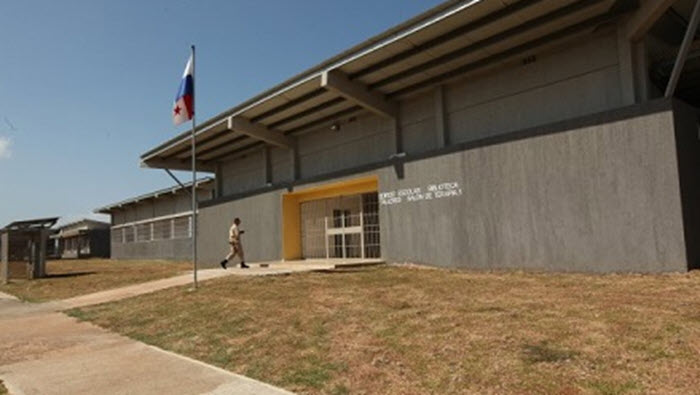The prospect of the coronavirus pandemic entering prisons is devastating in any country of the world given how dicult it would be, in such precarious environments, to prevent the virus from spreading. In Panama, we support prisons by providing hygiene, prevention and infrastructure supplies to tackle this global threat.
“Dad, now all of us are confined… I didn’t know enclosure was like this,” the boy says to his father, a detainee in La Joya prison in Panama. Carlos Jones is part of the prison’s maintenance brigades, set up by the ICRC in cooperation with Panamanian authorities. He was there this week when, together with the Ministry of Government, we donated hygiene, prevention and infrastructure supplies in response to the COVID-19 pandemic.
His wife also confesses that “she has never experienced anything like this,” and that she now has a better understanding of how someone feels inside a cell. “Only now is she truly able to relate to what it means to be confined,” says Carlos.
Perhaps this preventive isolation that most societies around the world are currently experiencing helps us understand that people who are serving a prison sentence are already undergoing punishment, and there is no need to add to it. “Maybe this will make people aware of what confinement really means. And that when we talk about the right to health care, family visits, food… we are not talking about luxuries, but rights. Prisoners have already lost their freedom,” says the head of the ICRC´s regional delegation in Panama, Giuseppe Renda.
Coronavirus and detention: the challenge of basic prevention
“We all want to reduce the humanitarian consequences of COVID-19 as much as possible. In the case of prisons, the diculties of complying with both of the basic measures that the World Health Organization (WHO) has identified as essential, that is, hygiene and physical distancing, represent an extraordinary challenge,” says Renda.
This donation of hygiene supplies (body and laundry soap, multi-purpose wipes) to be distributed to the prison population throughout the country, together with posters indicating how to prepare chlorine solution for disinfection and how to correctly wash hands, are some of the initiatives underway to counter this latent threat.
In La Joya prison, the existence of a global pandemic has confirmed the remarkable role that social reintegration plays: inmates who clashed with one another over internal disputes prior to joining the maintenance brigade, work side by side unloading humanitarian aid. “Here the idea that ‘you are from one gang and I am from another gang’ no longer exists. We are all in the same boat,” says Carlos.
Being prepared for infection
The coronavirus threat also compels authorities to optimize health-care capacities for the prison population, in the event that cases begin to multiply inside the prison.
To this end, the ICRC provided technical advice to the General Directorate of the Prisons System (DGSP) and the Oce of Infrastructure and Maintenance (OIM) regarding setting up a triage and quarantine area in the Virgen de la Merced Medical Centre, which serves La Joya and La Joyita prisons. This initiative also involves purchasing and delivering the materials needed for renovations, and manpower of the maintenance brigades from both detention facilities, supported by the ICRC in close cooperation with the Ministry of Government.
“It is important for us to have a place where we can isolate patients and treat mild cases,” explains Dr. Yilani Bernardo, deputy medical director of the clinic. This health centre routinely caters for sick patients and therefore does not have a primary care space for detection and surveillance of mild cases. In light of this situation, resources were provided to facilitate changes to infrastructure. “We hope that each prison will have its own isolation area,” says Bernardo.
Humanity and solidarity put to the test
According to the head of the ICRC in Panama, all faculties are required to find a solution that reduces risks of infection and prioritizes people’s health and lives, especially for high-risk groups, without overlooking administrative or health-care staff, and guards and policemen who work in the prison and go back home every night.
“The ICRC is constantly monitoring the situation, and providing advice and support to authorities in order to prevent the spread of the pandemic and to prevent its ensuing humanitarian consequences, as this donation shows,” he signals.
In Panama, the ICRC has been working with people deprived of their liberty since 1989, and in the last few years continuous work has been underway to support the prison system. This has involved both evaluating its legislative projects and the process of implementing re-entry initiatives such as Planting Hope, Ecosólidos and the Maintenance programme.
These initiatives have been beneficial not only for the lives of detainees and their reentry into society, but have also had a positive impact on the community.
